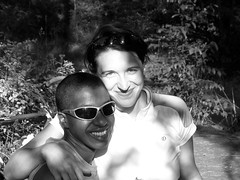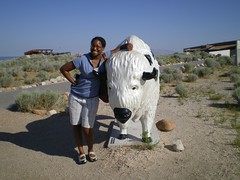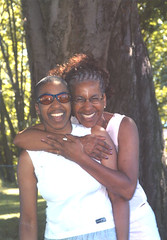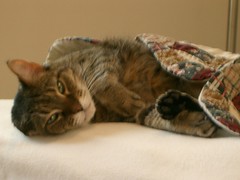I have pictures of my insides, and a gap in my memory. No, I didn't wake up in a tub of ice with my kidneys missing: I had my first colonoscopy. Thirty-seven is a little young to be having your first colonoscopy, but I have a high genetic risk for colon cancer—as evidenced by three close relatives who have all been diagnosed with the disease, two of whom did not survive. It was therefore highly recommended that I get screened early.
When you mention a colonoscopy to people who have had them done, they will most likely tell you that the worst part is the preparation. I would have to agree. It involves abstaining from solid foods the entire day before your procedure. You can only have clear liquids—this includes Jello as long as it's not purple or red in color. I recommend making some, so you can at least have the illusion of eating. The fun really begins when you start drinking your laxative prescription, usually Go-Lightly, to clean out your colon. I was tipped off by my doctor's office to flavor the drink with Crystal Light, which made the taste tolerable. You drink eight ounces, every ten to fifteen minutes until you finish the whole gallon. It takes about four hours, and once it starts working, you can pretty much plan on not straying too far from the bathroom. In fact, I recommend getting some nice padding for your toilet and firing up a DVD on a laptop. If you don't have a laptop, you can always settle in with a favorite book.
The next day, I showed up at the clinic, weak-kneed, with a sore spot in my lower back that I presumed was the result of my stomach caving in on itself. My partner Jessica drove me to the clinic. Because she is a nurse, we got permission from the doctor for her to watch my procedure, which made me more comfortable.
After filling out the ubiquitous paperwork, I was taken back to the preparation/recovery room, where I put on the ridiculous gown and waited. My nurse's name was Candy. It took some doing, but I refrained from making an obvious joke about stripers; especially since she was about to put in my IV. I've never had an IV before, but Jessica sticks them in all day at her job, so I know a lot about what makes them difficult. Candy examined the back of my right hand, tapping it occasionally and looking for a likely vein. The prospects weren't good, and it didn't help that I hadn't had anything to drink in the last three hours, per my instructions. “See that dip? That's a valve,” Candy said, pointing to where my vein petered out. “I don't think we're getting past there.”
“Why don't you try my arm?” I suggested. “I give blood regularly and they never have any problems.”
“The problem with that is, you have to keep your arm straight,” she said.
“That's OK. It's preferable to multiple sticks.” Sure enough, she got in on the first try and it didn't even hurt. Once I was all taped up, she took some time to explain the risks of the procedure. The possible complications include rectal bleeding (especially if any polyps are found and removed), nausea or vomiting from adverse reaction to the sedatives, and infection. The biggest hazard is intestinal perforation, or getting a hole poked in your colon. If that happens, you need immediate surgery to repair the hole and avoid death. This problem only happens in about .02 percent of cases, but it's one that has loomed large in my mind because my grandmother on my dad's side was one of the unlucky minority. She went in for a routine colonoscopy and the doctor perforated her colon. The clinic staff were more concerned with covering up their mistake than getting her to the hospital, which was some distance away. The hospital then dragged its feet getting her into surgery. She died two days later.
For this reason, I made sure my procedure took place at a clinic across the street from a hospital. I interviewed my doctor regarding her experiences performing the procedure, and asked if she'd ever had any complications (she hadn't). She assured me that since I was young and healthy, everything would most likely go smoothly. Still, I was happy that Jess would be there watching.
I actually had two procedures in the same appointment. First an endoscopy, to check my stomach for ulcers; then the colonoscopy. For short procedures such as these, most doctors use what is known as conscious sedation. This means they give you a drug to keep you calm and make you forget the procedure, but you're not actually asleep. The most commonly used drug combination is a dose of fentanyl for pain, combined with midazolam hydrochloride, also known as Versed, to keep you relaxed and make you forget. Although some people have adverse reactions to Versed, or trauma related to memory loss, I was completely on board with the idea of forgetting the pain. I suspected the endoscopy would be much worse than the colonoscopy. “Am I going to have a sore throat?” I asked the nurse as she prepared to give me the first drug.
Jess answered first. “Yeah, you will.”
My procedure nurse looked sheepish. “Well, we usually say no to that question...” In other words, she usually lies. I didn't see how you could have a big tube stuck down your throat without some residual effects.
“Hmm...I'll probably need ice cream to sooth it then,” I said. “Can I get that written in my take-home instructions?” This was now a running joke with me and Jess, ever since I persuaded my dentist to leave a fake voice mail stating that I should stay on soft foods—specifically ice cream—for the few days following my dental procedure.
With that, the nurse injected what she called 'a starter dose' of Versed and fentanyl into my IV. Within a minute, I started to feel drowsy. “Something's happening,” is the last thing I remember saying. Unfortunately, the starter dose proved to be somewhat inadequate. As if it were a very vivid nightmare, I can clearly remember the feeling of choking while the tube was snaking down my throat, and feeling as if I was going to throw up. I also remember Dr Breittenger telling me to try to breath, they were almost done. It was like a scene straight out of a horror movie, or one of those dreams where you desperately need to talk, but can't. Jess confirmed later that I struggled quite a bit until the tube was out, and my blood pressure skyrocketed to two hundred over one hundred. The doctor asked Jess to turn up my oxygen flow—they were busy holding me down and trying to finish quickly.
Once the tube was out, they increased my dose of Versed, and the rest of the procedure is a blessed blank spot in my memory. For the rest of the day, my brain danced in and out of awareness, and I struggled to put floating pieces into place. Rather than be disturbed by the gaps in my memory, I was completely fascinated. Poor Jess just found it irritating. Our conversations went something like this:
Me: (At home, waking up from a nap). Dang, I meant to get pictures!
Jess: We did get pictures honey. I showed them to you.
Me: You did?
Jess: Yes. Here they are.
And so it went. I became obsessed with trying to piece together dream-like sequences that I wasn't sure had actually happened. In each case, I would ask Jess to confirm the event. For instance, when we left the hospital, we made several stops before going home. Jess picked up my favorite fried rice dish from a restaurant near the hospital. Then I (apparently) decided that it would be a great time to stop at REI to try on some shoes I've been wanting. I have to order them on line, but I wanted to make sure of the size. As we walked into the store, I said something like, “Aren't I doing great honey?” In my mind, I felt completely alert, sure that I was 'passing' as a normal, un-drugged person. In reality, watching her tell the story to others later, her mimicry of me was more like a half-drunk person about to pass out. Hours later, a picture of myself, sitting on a bench, trying on a sandal came into my head. “Did we go to REI?” I asked, startled that an entire visit to my favorite store could dissolve into mist.
Images and conversations continued to float back to me in a haze for the rest of the evening. Sometimes specific mention of an event would bring something back as well. “You've got tomato soup in the cupboard,” Jess reminded me. Oh yes, we stopped at New Seasons and Fred Meyer on the way home and I asked for soup because my throat hurt.
I suppose I'm so fascinated by all this because I've never used recreational drugs, or even alcohol. Perhaps someone who spent their college years waking up in strange places after parties would find this sensation routine. The experience got me thinking about what complex creatures we are, and how amazing it is that my doctor can completely alter my brain, then go inside my body and come out with photos I can use to gross out my friends.
My colon, I'm happy to report, is clean as a whistle. Most of the risk factors for colon cancer are things I avoid already; cigarettes, red meat, alcohol. Due to my family history, I will probably need to have a colonoscopy every three to five years. Despite my paternal grandmother's tragic outcome, I will continue to have them done. Colon cancer is ninety percent preventable with regular check ups. For people with a family history of colon cancer, it's even more important to get screened. Survival rates go from ten percent to ninety percent if the cancer is caught in the early stages. My maternal grandmother was diagnosed with an early stage of the disease when she was fifty. She was treated with surgery and is still going strong at eighty-four years old. Sadly, she has now buried two of her children, who could have been saved with a timely colonoscopy screening.
Death is coming for all of us, and it's easy to carry the feeling of invincibility from your youth into adulthood. I've seen the results of putting off preventative care because you think you're too busy. My mom had excellent health care, but she buried her head in the sand when it came to her poor health choices. I'm determined not to follow in her footsteps.







1 comment:
The funny thing about being involved in one of these procedures is patients will sometimes make completely unexpected and utterly candid comments while they are medicated/sedated. Glad your went well
Post a Comment